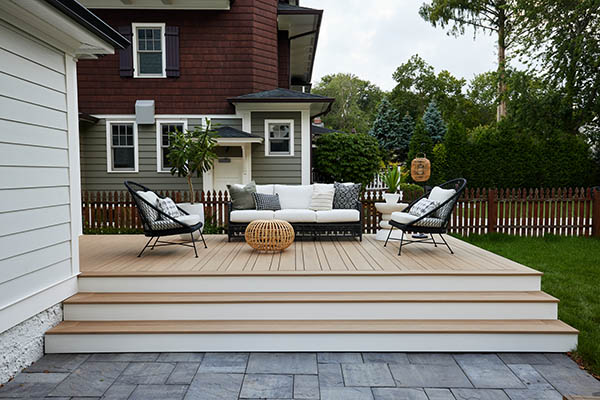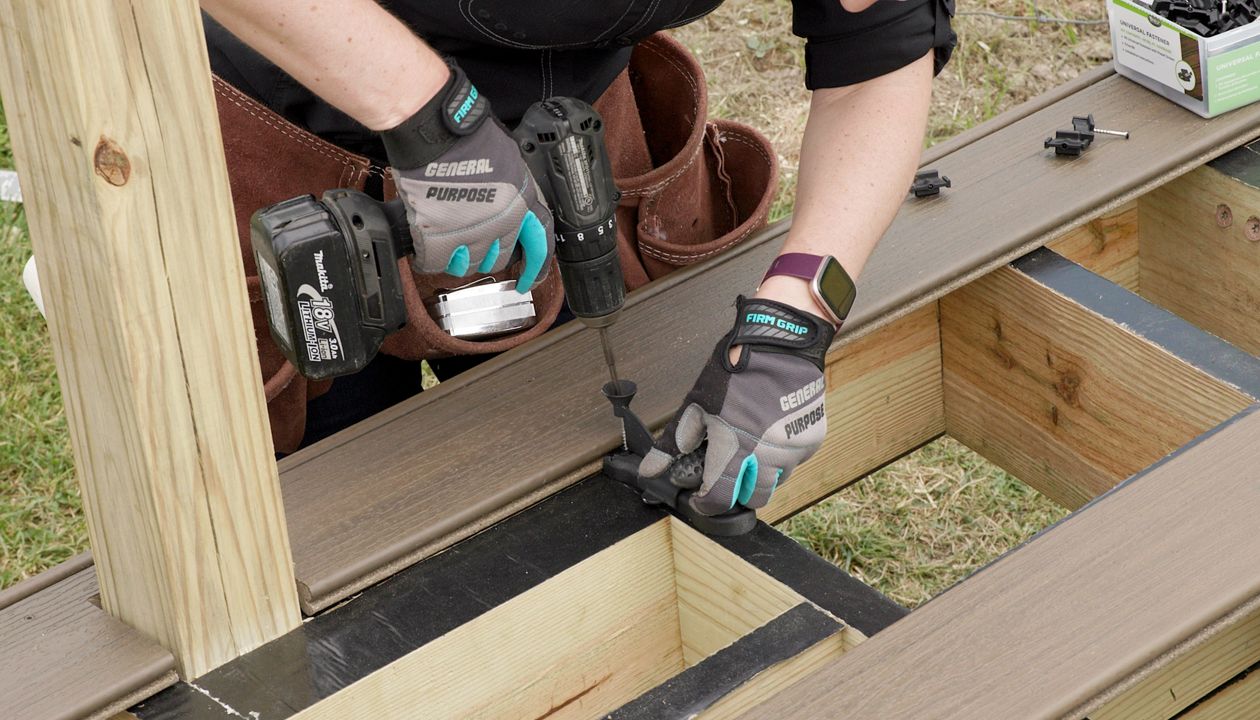Trust a local deck installer Austin to bring your backyard vision to life efficiently and affordably.
Just how to Pick the Right Products for Your Deck Setup Job
Selecting the ideal products for your deck setup task can appear challenging. The key is to stabilize your budget, layout preferences, and lifestyle requires to produce a deck that will enhance your exterior room for years to come.
Understanding the Different Types of Deck Products
When embarking on a deck setup project, the choice of products ends up being an essential choice. Different options are offered, each with one-of-a-kind features and aesthetic appeal. Conventional wood, for example, offers a timeless, all-natural appearance and is typically more economical. Nevertheless, it can warp with time and requires normal upkeep. Compound products, on the other hand, are a blend of wood and plastic, offering durability and resistance to weather elements. They require much less maintenance compared to wood yet are normally a lot more costly. One more alternative is plastic, which is basically maintenance-free and immune to pests and rot, albeit less natural-looking. By comprehending these differences, homeowners can make an extra enlightened decision on the most appropriate deck material for their specific demands.
Reviewing the Durability and Maintenance Needs of Deck Products
Assessing the resilience and maintenance demands of deck products is a vital step in deck installation. Toughness includes the material's capacity to endure harsh weather conditions, wear and tear, and its long life.
Understanding upkeep requirements is similarly important. Some products require normal sealing or staining to preserve their look and stand up to dampness damage, while others, like composite outdoor decking, require much less upkeep. By examining these elements, one can choose one of the most ideal outdoor decking product, guaranteeing an equilibrium in between sturdiness, upkeep requirements, and visual appeal.
Expense Evaluation: Comparing Wood and Compound Decking
Although cost might at first look like a second problem, it is a significant aspect when contrasting wood and composite outdoor decking. Timber, normally a cheaper option, has a lower in advance expense. Nonetheless, with time, maintenance expenditures can accumulate, potentially making wood more expensive in the future. These maintenance costs may consist of discoloration, sealing, or changing damaged boards. On the various other hand, composite decking, while pricier at first, needs less maintenance, possibly reducing long-term expenses. It's crucial to bear in mind that composite decking isn't invulnerable to wear and tear, and replacement expenses can be high. As a result, potential deck owners have to consider their budget and readiness to maintain their decks when determining between wood and composite decking.
Looks and Design Versatility of Decking Products
While cost is an important factor to consider, the visual allure and style versatility of outdoor decking materials also play a considerable function in the decision-making procedure. Different materials offer differing levels of aesthetic charm. Natural timber outdoor decking supplies a timeless, timeless appearance, while composite products supply a wide range of shades and textures to match varied preferences and designs. Design adaptability refers to the capability to form and manipulate the outdoor decking product to satisfy details design demands. Wood, for circumstances, supplies high style adaptability due to its convenience of reducing and forming. Compound materials, while much less versatile in design, are still versatile enough for many deck styles. These factors, for that reason, are important components in the choice of decking material.
Environmental Impact of Decking Materials
When selecting outdoor decking materials, one should think about not only aesthetics and sturdiness, yet also the environmental influence. It's crucial to analyze the sustainability of materials and explore recycled outdoor decking choices. In addition, recognizing the possible influence on neighborhood environments will certainly make sure a more ecologically liable selection.
Evaluating Material Sustainability
In the world of deck building and construction, examining product sustainability original site is an essential step. This involves assessing the environmental influence of each potential product, considering variables such as the power required for its production, its carbon footprint, and its end-of-life disposal or reusing options. Wood is an eco-friendly resource, but unsustainable logging techniques can lead to deforestation. Composite decking materials commonly integrate wood and plastic, minimizing the need for brand-new hardwood but enhancing reliance on fossil fuels. Light weight aluminum and other metals may be much more sturdy and recyclable, but their extraction and processing can be energy-intensive. Therefore, the choice of decking materials need to balance functionality, looks, cost, and sustainability to ensure an accountable and durable installation.
Recycled Outdoor Decking Choices

Compound outdoor decking is specifically popular due to its resilience and simplicity of upkeep. Recycled plastic decking, on the various other hand, is very resistant and needs minimal maintenance.

Influence On Local Ecosystems
While the advantages of using recycled materials for outdoor decking can not be overstated, it's similarly crucial to think about the broader environmental implications of these selections. The extraction, handling, and transportation of materials can exceptionally impact neighborhood environments. Logging for hardwood decking adds to environment loss and climate modification. Also the production of composite materials can launch dangerous exhausts. Conversely, using recycled or sustainably sourced products can help alleviate these results. Considering the lifespan of materials can minimize ecological influence; longer-lasting options require less frequent replacement, therefore saving sources. Appropriate disposal of old decking is crucial to lessening garbage dump waste. Basically, an eco-conscious deck job needs cautious material selection, sustainable sourcing, and liable disposal.
Making Your Decision: Tips for Picking the very best Deck Materials
As the write-up shifts into the subtopic of "Making Your Decision: Tips for Selecting the very best Deck Products", it is vital to comprehend the range of deck materials available. Striking an equilibrium between resilience and aesthetic appeal is vital in this selection process. The adhering to discussion will lead visitors in making an enlightened selection based on these key factors to consider.
Comprehending Various Deck Materials
The task of picking the appropriate products for your deck installation can appear daunting due to the large array of alternatives readily available. Plastic or PVC decks are even a lot more long lasting and need less maintenance than composite products, yet they can look much less natural. Aluminum decks are strong, light-weight, and immune to rot, yet they are likewise the most costly choice.
Longevity vs. Aesthetic Appeals Balance
Balancing resilience with aesthetic appeals can be a challenge when selecting deck products. The decision usually comes down to personal have a peek at this site choices and the deck's meant usage. High-traffic areas may necessitate resilient materials like composite outdoor decking, which holds up against damage however might do not have Continued the all-natural beauty of timber. On the various other hand, timber offers an ageless allure and warmth that synthetic materials battle to replicate. Nonetheless, it requires a lot more upkeep and may not last as long. House owners require to strike a balance, considering both the deck's practical demands and their aesthetic preferences. By doing so, they can guarantee their deck continues to be a practical and eye-catching exterior room for years to find.
Final thought
Finally, picking the right products for your deck installment task calls for mindful factor to consider of aspects such as durability, maintenance, cost, appearances, and ecological influence. Whether you select typical wood or composite materials, your selection ought to align with your budget, style preferences, and lifestyle. Ultimately, the best outdoor decking product is one that boosts your exterior area and supplies enjoyment for many years to come.